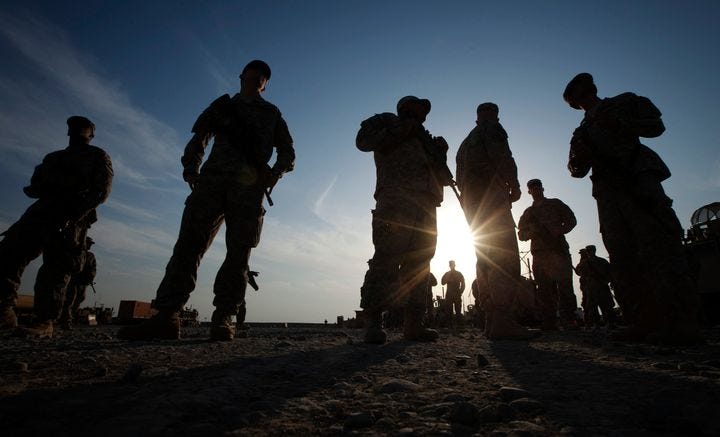Yesterday, I saw a reminder that May (the entire month!) is for “military appreciation.” WTF? We have Memorial Day and Veterans Day and even Armed Forces Day, but now we need an entire month to “appreciate” the U.S. military?
I served in the military for twenty years on active duty, and even I find this crazily (and dangerously) absurd.
It reminded me of this article I wrote for Huff Post back in 2012. It can be perilous indeed to admire and “appreciate” the military and its self-styled “warriors.”
The Peril of Idolizing Our Military
As a retired veteran, such pro-military rhetoric in the president's state of the union address resonates with me, but as a student of history it makes me more than uncomfortable.
By William Astore, Contributor
Writer, History Professor, Retired Lieutenant Colonel (USAF)
Feb 4, 2012, 05:53 PM EST
Do you believe with President Obama that our military today constitutes a "generation of heroes" and that their teamwork and courage in battle show us the proper path forward in civilian life? Do you believe that the deadly effectiveness of the Navy SEAL team that killed Osama bin Laden should inspire us to put aside differences in politics and to work together as a people?
As a retired veteran, such pro-military rhetoric in the president's state of the union address resonates with me, but as a student of history it makes me more than uncomfortable. In democratic societies, armed forces are funded and fielded to preserve liberties, not to provide templates for personal and societal behavior.
When civil aspirations are guided by and defined within military matrices, one gets the Iraq war of yesterday, the Afghan war of today, and the Iran (or Syria or insert-new-terrorist-nation here) war of tomorrow. Forever war is indeed the price for a nation that glorifies its military as the very best of its people and their ideals.
The kinetic (killing) competency of our military is certainly impressive, yet it's a competency that we must use judiciously and with restraint. When we elevate it as an example of "I've got your back" teamwork that all should be emulating, we tend to devalue diplomacy and the level of patience and perspective our country needs to display in an increasingly turbulent world.
Our dedicated military and its matchless strength should afford us the luxury of being patient and of keeping threats in perspective. But our unbridled extolment of the military -- our deeply personal investment in its power and methods as pointing the way forward in all walks of life -- encourages us instead to deploy our armed forces time and time again. We act impatiently, injudiciously, against threats we often exaggerate.
Iran is the latest such threat that has the drums of war beating. Iran is supposedly an incipient nuclear terrorist; defined as such, the preferred solution for our nation of military enthusiasts is decapitation by kinetic action.
But is the solution really that simple? Past events suggest otherwise. Military enthusiasts like George W. Bush, Dick Cheney and Donald Rumsfeld believed they could torture and kill their way out of the war on terror. They embarked on a deadly game of "Whac-A-Mole" with results as frustrating as that game. After criticizing them for this, the Obama Administration joined them. Like Michael Corleone in the Godfather saga, we keep whacking our enemies, yet a state of war and terror drags on, insidiously warping our nation's core beliefs and freedoms.
If we continue to focus on whacking terrorists (or terroristic nations), we suppress any chance of charting a less violent, less terrifying, course. Like Michael Corleone in The Godfather: Part III, just when we think we're out of the war on terror, they'll pull us back in.
What we won't recognize is that the "they" doing the pulling will be us. We won't recognize it because we've invested so much of our national hopes and dreams into the killing abilities of our armed forces.
Yet however much we admire their competence in war, we must not allow that competence to inform our attitudes and aspirations for civil society. For when warriors become the civil elite, the role models par excellence, democracy is imperiled.







A laudable essay. I grew up in the shadow of American “militarism” born at the time of the battle Stalingrad just a few miles east of Mannheim on the Rhine river. I witnessed the return of uncles from and other Germans who suffered from PTSD and drowned it in alcoholism. They also believed in the “matchless strength” of the German military at the time. More dramatic for me as a young child and youth was having to take into an already overcrowded house bombed out families and individuals. In addition, most of my classmates from the late forties on had no father. My point is that I know personally the real impact of war. Americas have never faced or experienced anything close to what I saw and can’t forget. This will change when American cities lie in ruins, people are buried in the rubble and the bombed out homeless roam across America. This is a possibility if our politicians and military leaders don’t wake up to the fact that bravery, heroism and matchless strength are empty words in the wake of death and destruction across the country. 2024 is not 1945 when America won (with major help from the Red Army) and emerged as the unrivaled power on earth. That realization has lulled America’s leaders into a state of dangerous hubris. This is particularly ironic since none of the recent presidents served in the military. Talk by these individuals is empty rhetoric devoid of any understanding what a bloody mess was actually is.
It is all a continuation of what General Smedley Butler called a racket. He described how he was sent all over the world to prop up US corporations in foreign lands, starting over 100 years ago. It was all about money then, and it is still all about money now. US corporations are heavily invested in Israel and in Ukraine, and they want their assets protected. The frantic nature of the talk about Ukraine in particular is because very large investments are at risk. This is all happening because of unregulated capitalism gone wild. If we want to end the endless wars for profit, we need to tame unregulated capitalism.